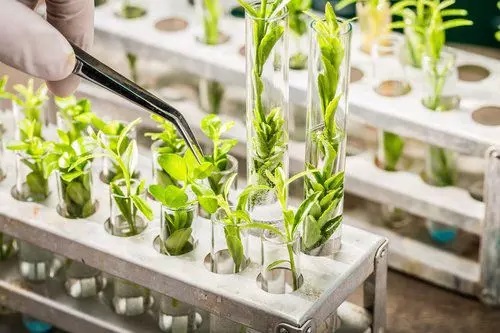
The world is experiencing a population boom. As such, meeting food demand producing in a conventional way has proved to be unsustainable.
Therefore, transforming agriculture through adopting bio-technology including the use of transgenic crop by considering bio-safety of the environment has been taken as a way out.
However, the issue of utilizing GMO crops is still entertaining a heated debate between proponents and anti GMO lobbyists.
Meseret Achame is an expert in the National Bio-safety Advisory Committee Supporting and Capacity Building under the auspicious of the Ministry of Environment Forest and Climate Change. In an interview with this reporter, he said that, Ethiopia is signatory nation to the Cartagena protocol which stipulates utilizing technology without compromising bio-diversity.
The protocol serves to regulate the utilization of GMO in Ethiopia. Unless the technology is utilized properly it might inflict harm on humans, animals and the environment at large.
In addition to the protocol, the Ministry of Environment Forest and Climate Change has introduced directives which indicate how to move GMO crops from place to place, how it could be stored, how to see to its deregulation and supply to the market.
As to Meseret, currently the Ethiopian Agricultural Research Institute is the only entity which got permission to engage in GMO research. Currently, BT cotton and BT maize have passed through confined field trials.
After five years of experiment, BT cotton has now proved fit and deregulated.
The experiment of BT maize which is known as “water efficient maize for Africa” has the capacity to resist drought and pests. It is undergoing tests in Bako and Melkassa agricultural research institutions. Now it is nearing completion and the National Biosafety Advisory Committee is reviewing the document and the application dosage.
The outcome of the experiment will be given a multi-trial location or it will be deregulated and supplied to farmers.
In addition to these, the EARI has proposed to conduct application dossier research on potato. That is under scrutiny.
On the other hand, an Ethiopian scientist is conducting study on animals in two agricultural research institutions.
According to Meseret, the GMO crops come to Ethiopia for two purposes one for education and the other for research through contained and confined use.
When the GMO research is submitted to the National Biosafety Advisory Committee, first the applicant will be given special permit.
When the experiment is through the advisory committee supervises the process from tree seedling planting up to post harvesting and ensuring whether the research is conducted based on the Cartagena protocol or not, whether it fulfilled the requirements stipulated by the directives on utilizing GMO or not.
It also cross-checkes whether it is conducted in isolated fenced place in harmony with the biodiversity, human and animal health. Whether it poses cross-pollination effect or not.
In the past, to raise productivity agricultural research was conducted in the conventional way and some still argue that it is possible to enhance productivity without resorting to applying trans-genic crops. While reflecting his views in this regard, Meseret noted that, population is growing rapidly worldwide.To enhance both the quantity and the quality of food supply applying new technology is essential.
Doing things as business as usual way will never bring long lasting solutions. Hence, utilizing bio technology has been taken as preferred solution to modernize agriculture.
Now the world is changing from traditional breeding system to biotech which includes genome editing and synthetic biology.
In the Ethiopian context, dwelling in conventional research method does not enable to meet the future.
Currently in our country cotton is widely utilized as input for textile industries. However, the local species of cotton is highly vulnerable to fall army and doll army worms which critically affect the product. To eradicate the worms, various traditional methods were applied including spraying pesticides but the efforts were unable to bring a long-lasting solution.
Spraying pesticides in addition to bringing negative effect on the environment by killing other harmless insects, it needs more labor and time to reach vast areas. The task is very expensive. On the other hand, through time the worms develop resistance to the pesticides.
Hence, to bring long lasting solution scientists took the Bacillus genesis DNA from the bacteria in soil and inserted in the cotton plant so that it allows to resist the worm. Such experiment has been conducted in seven places in Ethiopia.
Therefore, as compared to the traditional breeding system, the transgenic method has brought better result in doing away with the harmful worms and producing quality cotton.
Nevertheless, anti GMO activists have still continued their argument that the transgenic bio tech has its own demerits and cited the BT cotton experience in Burkina Faso.
They further argue that farmers, who planted BT are unable to get better outcome. Reflecting his view in this regard Mesert said that, the debate on the matter between pro and anti GMO activists is none stoppable. But the debate is motivated by the conflict of interest.
For example, European activists do not support the application of GMO in farm because many companies there are engaged in producing pesticides and they assume that the introduction of GMO is a threat to the companies’ market. But the technology has brought about positive outcome on rising agricultural productivity. As compared to other countries, Ethiopia has come across the technology lately and the experiment is in progress.
Ethiopia is located in East Africa and its neighbors such as Sudan and Kenya have long legalized GMO technology particularly on maize and cotton. Hence, transgenic crops in the border areas of Ethiopia abutting the two countries might get into inland through trade or other means.
Asked whether his institution has a capacity to monitor that, farms in those areas are free from GMO plants, Meseret answered. Such situation might occur but in order to supervise the matter the institution has dispatched the monitoring team in the Metema town areas and ensured that no farmer has utilized the GMO crop.
BY ABEBE WOLDEGIORGIS
ETHIOPIAN HERALD 24 SEPTEMBER 2021





